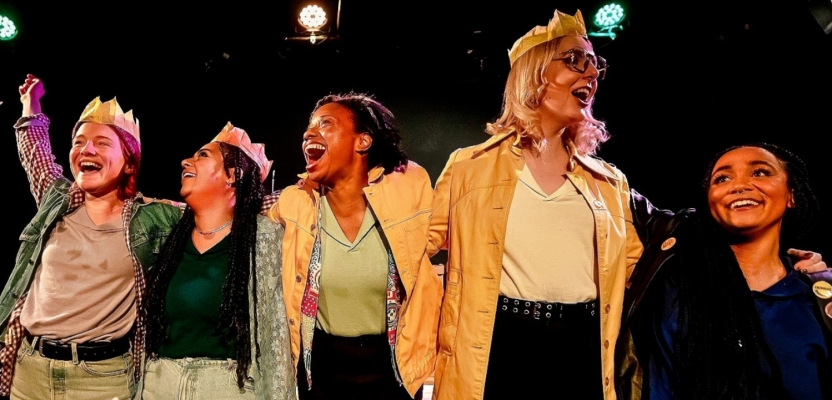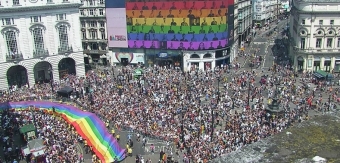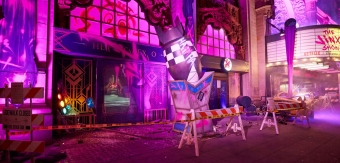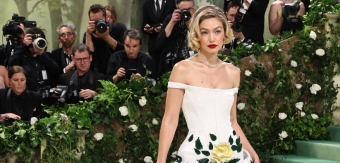This week, I had the pleasure of speaking with Chloe Christian and Olivia Dowd, the brilliant co-directors behind the powerful new production GRILLS, which is set to headline The Camden Roar Festival at Camden People’s Theatre from Tuesday, June 4th, until Saturday, June 22nd.
GRILLS delves into a pivotal era when the Government's Section 28 legislation sought to silence queer voices. This storied re-telling highlights one of London’s most significant queer organizations: the Camden Lesbian Centre and Black Lesbian Group.
The narrative follows Vall as she embarks on a journey to Glasgow, home to the group’s archive, where she uncovers the stories of its founders and imagines life as a queer person in 1980s London. Through this exploration, the show interrogates the parallels between past and present, delving into the multifaceted nature of queerness and the vital role of community during times when the right to gather is under threat.
Chloe and Olivia have deeply immersed themselves in the history and significance of LGBTQ+ spaces in the UK. Their extensive research included a personal visit to the Glasgow archive, where they engaged with artefacts from this nearly forgotten queer institution. Their poignant re-imagining of these stories is not just a reflection on the past but a commentary on the current existential battle faced by LGBTQ+ venues in the UK.
In today's interview, we explore the profound importance of these spaces, which serve not only as social hubs but also as community centers where individuals can express their authentic selves, learn about their heritage, and discover new forms of creative expression. Despite London's reputation as a bastion of inclusivity, the city has seen a dramatic reduction in LGBTQ+ venues, with about 60% having closed since 2002. For lesbian venues, the outlook is even bleaker, with only a handful remaining.
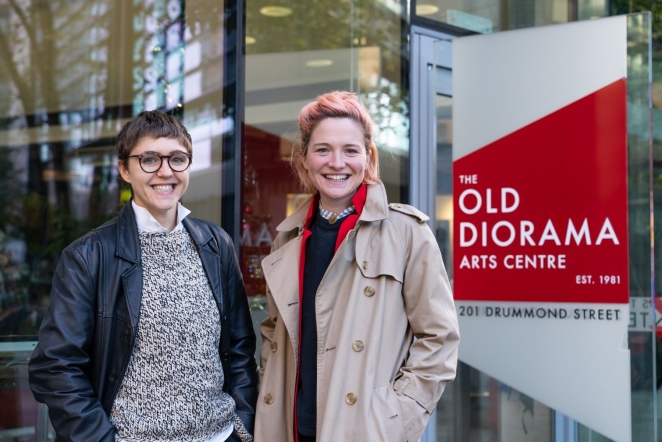
Chloe (left) and Olivia (right)
Join us as we dive into Chloe and Olivia’s inspirations, the critical importance of preserving LGBTQ+ spaces, and how GRILLS aims to shine a light on these essential issues.
Can you tell us a bit about the inspiration behind "GRILLS" and how the project came to life?
We came across a video that GalDem did with Levi’s and Joy Yamusangie back in 2019 about the Camden Lesbian Centre and Black Lesbian Group. Growing up in Camden and living there in our adulthood as queers we were amazed we’d never heard of it so inevitably wanted to know more. We were lucky that Camden People’s Theatre had put a call out for Camden makers telling Camden stories, we pitched and won the commission.
How did the historical context of Section 28 and the Camden Lesbian Centre and Black Lesbian Group influence the narrative of the play?
The play formed out of the archive of the CLCBLG, so it is sort of like a response to what we found. This includes a whole host of flyers, posters and references to protests opposing the clause as well as how it was affecting everyone in the minutiae of the meeting minutes and call logs. One of the events becomes a key component in the narrative and of course the inevitable funding cuts and angst that came with it plays a huge role.
What were some of the most surprising or moving discoveries you made during your research at the Glasgow archive?
I think the sheer volume of work they put into creating the centre and keeping it running. There were so many different groups that accounted for a range of individual experiences. At the Centre, you could find GEMMA, the disabled lesbians support group; Zammimass & Young Zamis for radical Black lesbians; Shakti Khabar, the South Asian Lesbian and Gay Network’s newsletter; Onyx for socials and discussions among “Black Lesbians and Lesbians of Colour”; and numerous events, socials, and support groups for mothers, unwaged people, survivors, and those still closeted.
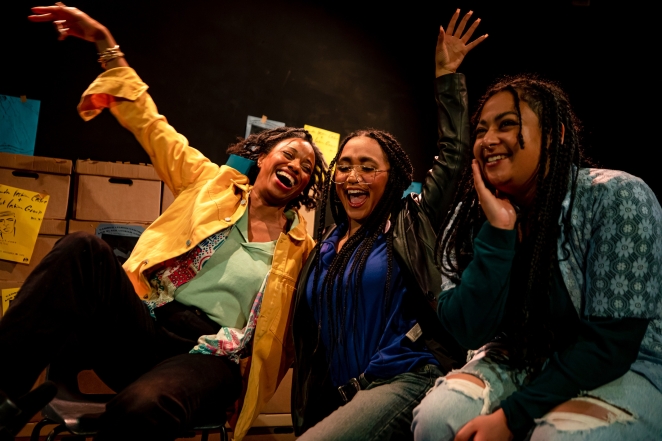
It all contributes to this real feeling of energy and activity. Some of the more surprising things we’ll leave until you come and see the play but it’s important to say, like with all organising, it wasn’t all rosy.
The play explores parallels between the 1980s and today. What are some of the key similarities and differences you’ve identified?
In many ways the centre was doing the work that often fits in between the state and the private sector - and in that respect we could relate to a lot of what we found to today’s organising space too. Although, when it initially opened they actually had cash to play with. We also discovered terminology considered contemporary (such as intersectionality, men who have sex with men, and Women of Colour) used casually.
LGBTQ+ spaces have been declining significantly in recent years. Why do you think it’s important to preserve these venues, and what impact do their closures have on the community?
Physical spaces to gather are fundamental to human existence. It’s brilliant that social media can make LGBTQIA+ folks feel a sense of belonging but if we don’t have space to come together, talk, listen, dance, protest, be seen and feel safe, then we will not only continue to be marginalised in our personal lives, within our families, places of work and public spaces but also run the risk of polarising ourselves too.
How do you envision the role of LGBTQ+ spaces evolving in the future, especially considering current social and political climates?
Although London is known for its inclusivity and progress, figures from the Greater London Authority show a concerning trend: around 60% of LGBTQ+ venues in the city have closed since 2002, leaving only about 50. The situation is even more dire for lesbian venues, with only a tiny number of dedicated lesbian bars left in London.
Yet lesbian nights and culture are on the rise. Recently a tapas and lesbian-specific pop-up bar, La Camionera, went viral because of its queues round the block - supposedly word spread on group whatsapps. In the same week, a private members lesbian bar named L Community launched and was rightly criticised for its trans exclusionary policy. And recently the Royal Vauxhall Tavern closed because of punters and performers not feeling aligned politically with the venue’s choice to host the Eurovision.
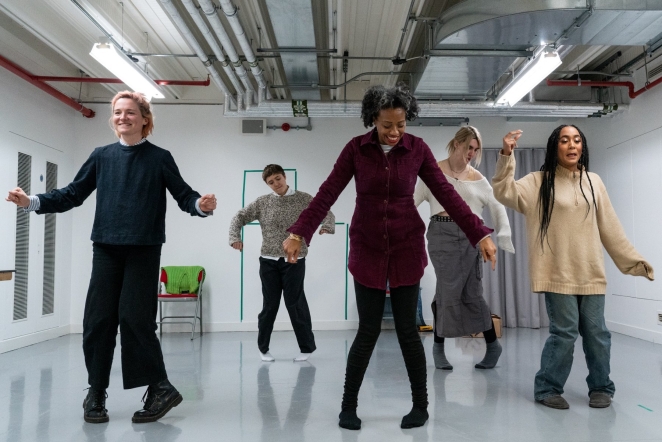
So we could see queer venues and nights going underground again or we could see them going extinct completely. A lot of people are tired and burnt out and with London’s rental costs getting more and more unattainable it is likely that more members of the community will be forced out of the city. Inevitably the young professional will follow and the gentrification cycle will continue…
What challenges did you face in bringing the stories of the Camden Lesbian Centre and Black Lesbian Group to the stage, and how did you overcome them?
Much of the interpersonal relationships between the members has been imagined. We struggled to build a concrete idea of the interactions between the members during the moments of tension we found in the archive. Although we initially spoke to a few of the original members, we were asking them to remember details from 30 years ago which is, understably, a challenge.
It felt important that we didn’t make a show that tried to piece together their reality. Instead we focussed on what we found in the archive and what we were interested in exploring, looking closer at and collectively imagining. For instance, some of the meeting minutes we found had been redacted which immediately piqued our interest. Why had they been? What did someone not want to be kept and what does that tell us? Etc… Because we didn’t have access to those answers we began to imagine them ourselves.
In what ways do you hope "GRILLS" will resonate with contemporary audiences, both queer and otherwise?
I think many people will relate to the themes around power and hierarchy, how it feels to be part of a marginalised community and what happens when resources are continuously squeezed.
The play delves into the idea of cultural memory and representation. How do you think theatre can contribute to preserving and promoting LGBTQ+ history?
It’s cliche but I think it’s about continually unearthing stories that haven’t been told, particularly BIPOC and trans stories.
Can you share a bit about the creative process behind weaving together real historical events with fictional elements in "GRILLS"?
We went to the Glagsow Women’s Library and delved into the archive. When we were there we tried to capture as much as possible. We then brought it all to an R&D and asked the cast to explore it themselves and choose the things that interested them.
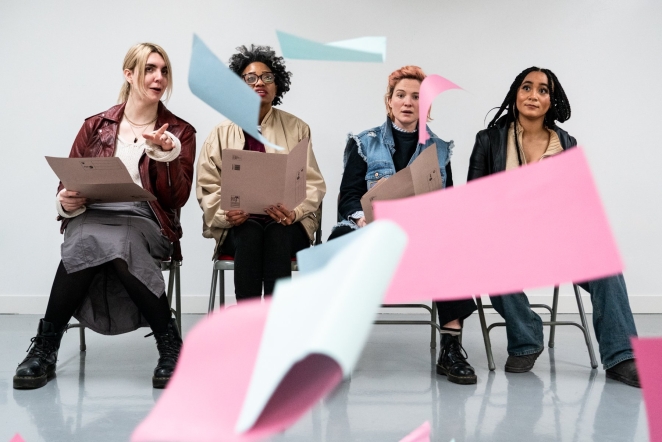
Once we had these areas of interest (events, characters, context) we started to improv around them, imagining the things that we didn’t know as well as what we did and then eventually started joining the dots and weaving a narrative. Of course we couldn’t help but draw parallels to the current moment, so we started to thread in a contemporary narrative too which include these archivists commenting on what they’re finding just as we were.
What message do you hope to convey about intergenerational queerness and the importance of learning from our past?
In our exploration of the CLCBLG archive, we also found examples of institutionalised racism and a constitution that flip-flopped between accepting “women born as women” and excluding “constructed females.” Seeing even a snippet of their debates around this, between redactions, photographs, and hand-scribbled notes, you have to wonder—where would these conversations be now if this centre had continued to exist?
Some of the most radical protests for queer rights in the 80s and 90s were thanks to lesbians. We are facing a nationwide rollback of the Gender Recognition Act, Section 28 style gender and sex education policing, and public claims from our Secretary of State for Business and Trade—Kemi Badenoch—that the UK has not profited from slavery or colonialism. If this is where we are now, where would we be if this centre had continued to thrive? If we had continued to have a space to organise?
How has the response been so far from the LGBTQ+ community and the general public to the themes and stories presented in "GRILLS"?
We had a sold out run at the end of 2022 in its first iteration so I hope that bodes well for this time round! We also met some historians Paula Akpan and Jade Bentil after the show who asked for the poster of GRILLS to put in their black queer archive which was kind of amazing in its meta-ness. They are now going to create an exhibition in dialogue with the CLCBLG archive and their own black queer archive, towards the end of the year as a result to, so watch this space!
What are some of the key takeaways you want the audience to have after experiencing "GRILLS"?
I think we’re hoping to find a balance between celebration and critique, on both a micro and macro level. We don’t know many of the individuals involved in the centre which I think speaks for itself but we do know some of the policies they had, the letters exchanged with the council and other orgs/individuals and fights they were fighting. There was clearly a lot of graft and care in some places and a lot of discrimination and in-fighting elsewhere.
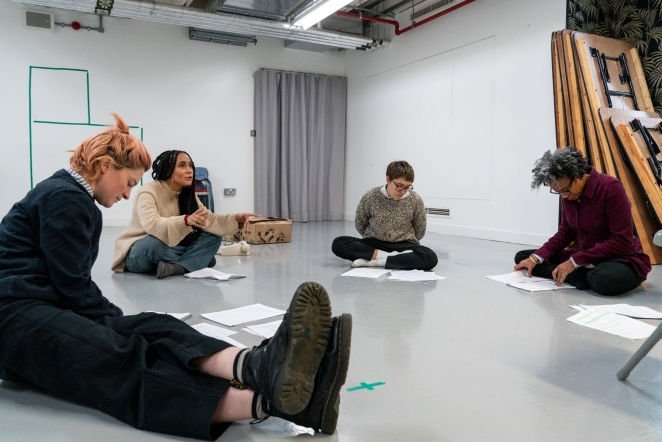
If the centre hadn’t closed perhaps the latter could have been resolved, perhaps we wouldn’t be in the place we are today where there is such toxicity aimed at trans people and perhaps we would know the individuals and have healthy, mentoring relationships with them that so many of us crave. Or perhaps we could have learned that ‘the master’s tools will never dismantle the master’s house’ and would have been further ahead with creating new, robust, caring structures.
Could you talk about any specific moments or scenes in the play that are particularly meaningful to you and why?
There is a piece of creative writing we found which we perform pretty much verbatim. It reads like a parody and is very funny, like something Victoria Wood could have written. It also takes us out of the tension of the rest of the play for a moment. It feels important because it’s an example of something that could have been completely buried. It’s also there as a reminder that we need to hang on to humour and solidarity in times of injustice.
How do you see the role of art and theatre in challenging social norms and advocating for marginalized communities?
I think there is something undeniable about being in a shared, physical space and hearing and feeling the embodied stories of marginalized communities. As digital spaces continue to polarise us and fuel fear and anger, art and theatre has a duty and special power to slow us down, to question our biases, to provoke, to make us feel, to sit side by side or be confronted directly with people who perhaps don’t share our views and listen and be challenged and feel uncomfortable.
GRILLS will be at Camden People's Theatre as part of CPT's 30th Anniversary Camden Roar Festival from 4th - 22nd June. Tickets and accessibility information can be found at: https://cptheatre.co.uk/whatson/grill
